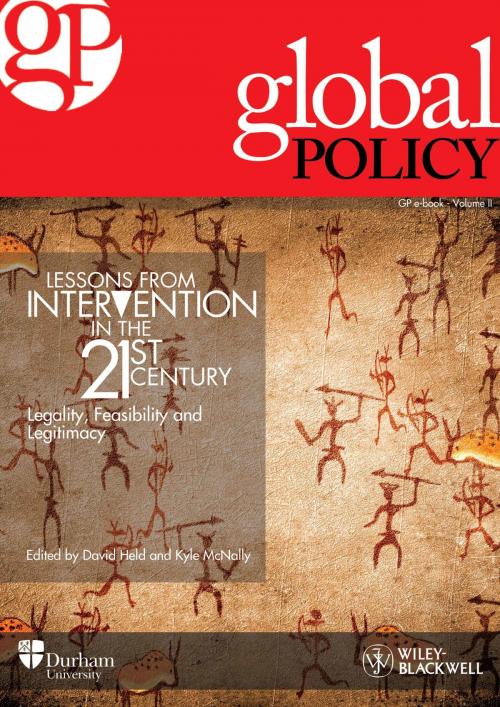Lessons from Intervention in the 21st Century: Legality, Feasibility and Legitimacy
Nonfiction, Social & Cultural Studies, Political Science, International| Author: | Global Policy | ISBN: | 9781310669668 |
| Publisher: | Global Policy | Publication: | January 6, 2015 |
| Imprint: | Smashwords Edition | Language: | English |
| Author: | Global Policy |
| ISBN: | 9781310669668 |
| Publisher: | Global Policy |
| Publication: | January 6, 2015 |
| Imprint: | Smashwords Edition |
| Language: | English |
Debates about military intervention, humanitarian or otherwise, typically involve two poles: the legality of intervention in relation to international law and the feasibility of those interventions. Legality is typically understood as specified by Chapter I (Article 2) and Chapter VII (Article 51) of the UN Charter, which firmly defend the sovereign equality for all member states, while sanctioning war only in the case self-defence and threats to international peace and security, respectively.
Feasibility is taken here as the capacity to resolve such breaches and/or restore a sustainable peace. Prima facie it seems a straightforward term to grasp but it raises many complex considerations. Feasibility is always about judging the required means to achieve a particular end – the protection of civilians, the eradication of a despotic regime, providing relief to populations under severe threat.
There is another range of issues that needs consideration. These centre on the concept of legitimacy, where questions are inevitably raised by the limited nature of legal argument. What is considered legal in some instances, may not be considered legitimate, and vice versa.
Taken together, all of this suggests a three dimensional inquiry into the nature of intervention. A range of possible arguments is plausible as a response to these issues. Edited by David Held and Kyle McNally, this e-book brings together world-class academics and practitioners to comment on these issues.
Contents:
INTRODUCTION
David Held and Kyle McNally – Lessons from Intervention in the 21st Century: Introduction and Framework
SECTION I - THE CONTOURS OF DEBATE
1. Andrew Linklater – Intervention and Civilization2. Gareth Evans - Legality, Legitimacy and Feasibility
3. I. William Zartman – Intervention in the 21st Century: Feasibility and Legitimacy
4. Jean-Marc Coicaud – International Humanitarian Interventions, Conflicts of Legitimacy and the Question of International Solidarity
5. Anne Orford – The Politics of Anti-Legalism in the Intervention Debate
SECTION II - INTERVENTION IN FOCUS
6. Michael W. Doyle and Camille Strauss-Kahn – Liberalism, Intervention and Regime Change: A Problematic Record
7. Simon Adams – Libya and the Responsibility to Protect: Results and Prospects
8. Steven A. Zyck – Foreign aid as intervention in Yemen: how assistance to weak states prioritises feasibility over legitimacy
9. Paul Rogers - US Intervention in Afghanistan and Iraq
10. Michael Ignatieff – Escaping from Fatalism in Syria
SECTION III - LIMITS, QUESTIONS AND WAYS FORWARD
11. Thomas Weiss – Military Humanitarianism: Too Much or Too Little?
12. Charles Kupchan – Intervention: Prospects and Limitations
13. Ramesh Thakur – Combining UN Global Reach and Authority with US Power
14. Anne-Marie Slaughter – A Regional Responsibility to Protect
15. Richard Falk – A Presumption Against Intervention
16. Thomas Risse – No Success Without Legitimacy! A Comment on Military Interventions
CONCLUSION
David Held and Kyle McNally – Reflections on Intervention: Legality, Legitimacy and Feasibility
Debates about military intervention, humanitarian or otherwise, typically involve two poles: the legality of intervention in relation to international law and the feasibility of those interventions. Legality is typically understood as specified by Chapter I (Article 2) and Chapter VII (Article 51) of the UN Charter, which firmly defend the sovereign equality for all member states, while sanctioning war only in the case self-defence and threats to international peace and security, respectively.
Feasibility is taken here as the capacity to resolve such breaches and/or restore a sustainable peace. Prima facie it seems a straightforward term to grasp but it raises many complex considerations. Feasibility is always about judging the required means to achieve a particular end – the protection of civilians, the eradication of a despotic regime, providing relief to populations under severe threat.
There is another range of issues that needs consideration. These centre on the concept of legitimacy, where questions are inevitably raised by the limited nature of legal argument. What is considered legal in some instances, may not be considered legitimate, and vice versa.
Taken together, all of this suggests a three dimensional inquiry into the nature of intervention. A range of possible arguments is plausible as a response to these issues. Edited by David Held and Kyle McNally, this e-book brings together world-class academics and practitioners to comment on these issues.
Contents:
INTRODUCTION
David Held and Kyle McNally – Lessons from Intervention in the 21st Century: Introduction and Framework
SECTION I - THE CONTOURS OF DEBATE
1. Andrew Linklater – Intervention and Civilization2. Gareth Evans - Legality, Legitimacy and Feasibility
3. I. William Zartman – Intervention in the 21st Century: Feasibility and Legitimacy
4. Jean-Marc Coicaud – International Humanitarian Interventions, Conflicts of Legitimacy and the Question of International Solidarity
5. Anne Orford – The Politics of Anti-Legalism in the Intervention Debate
SECTION II - INTERVENTION IN FOCUS
6. Michael W. Doyle and Camille Strauss-Kahn – Liberalism, Intervention and Regime Change: A Problematic Record
7. Simon Adams – Libya and the Responsibility to Protect: Results and Prospects
8. Steven A. Zyck – Foreign aid as intervention in Yemen: how assistance to weak states prioritises feasibility over legitimacy
9. Paul Rogers - US Intervention in Afghanistan and Iraq
10. Michael Ignatieff – Escaping from Fatalism in Syria
SECTION III - LIMITS, QUESTIONS AND WAYS FORWARD
11. Thomas Weiss – Military Humanitarianism: Too Much or Too Little?
12. Charles Kupchan – Intervention: Prospects and Limitations
13. Ramesh Thakur – Combining UN Global Reach and Authority with US Power
14. Anne-Marie Slaughter – A Regional Responsibility to Protect
15. Richard Falk – A Presumption Against Intervention
16. Thomas Risse – No Success Without Legitimacy! A Comment on Military Interventions
CONCLUSION
David Held and Kyle McNally – Reflections on Intervention: Legality, Legitimacy and Feasibility















